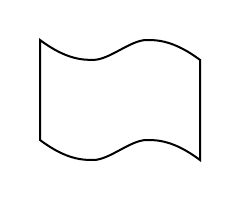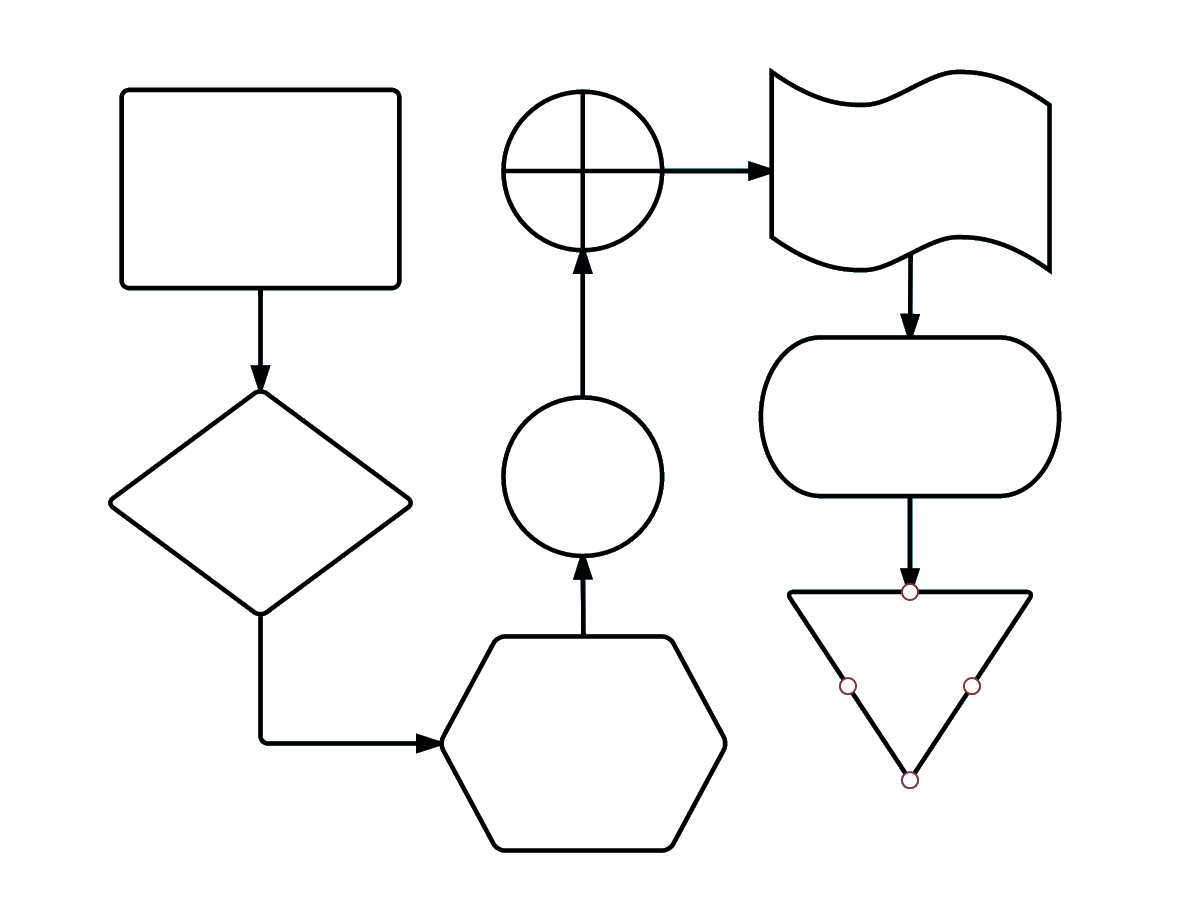Don’t be intimidated by the wide array of flowchart shapes. Each symbol has a specific meaning and context where its use is appropriate. If you get confused while drawing your flow chart, remember that most charts can be drawn with just a few common symbols, which are listed below.
4 minute read
Want to create a flowchart of your own? Try Lucidchart. It's fast, easy, and totally free.
Common flowchart symbols
These flowchart shapes and symbols are some of the most common types you'll find in most flowchart diagrams.
| Flowchart Symbol | Name | Description |
|---|---|---|
 | Process symbol |
Also known as an “Action Symbol,” this shape represents a process, action, or function. It’s the most widely-used symbol in flowcharting. |
 | Start/End symbol |
Also known as the “Terminator Symbol,” this symbol represents the start points, end points, and potential outcomes of a path. Often contains “Start” or “End” within the shape. |
 | Document symbol |
Represents the input or output of a document, specifically. Examples of and input are receiving a report, email, or order. Examples of an output using a document symbol include generating a presentation, memo, or letter. |
 | Decision symbol |
Indicates a question to be answered — usually yes/no or true/false. The flowchart path may then split off into different branches depending on the answer or consequences thereafter. |
 | Connector symbol |
Usually used within more complex charts, this symbol connects separate elements across one page. |
 | Off-Page Connector/Link symbol |
Frequently used within complex charts, this symbol connects separate elements across multiple pages with the page number usually placed on or within the shape for easy reference. |
 | Input/Output symbol |
Also referred to as the “Data Symbol,” this shape represents data that is available for input or output as well as representing resources used or generated. While the paper tape symbol also represents input/output, it is outdated and no longer in common use for flowchart diagramming. |
 | Comment/Note symbol |
Placed along with context, this symbol adds needed explanation or comments within the specified range. It may be connected by a dashed line to the relevant section of the flowchart as well. |
Want to create a flowchart of your own? Try Lucidchart. It's fast, easy, and totally free.
Create a flowchartAdditional flowchart symbols
Many of these additional flowchart symbols are best utilized when mapping out a process flow diagram for apps, user flow, data processing, etc.
| Flowchart Symbol | Name | Description |
|---|---|---|
 | Database symbol |
Represents data housed on a storage service that will likely allow for searching and filtering by users. |
 | Paper tape symbol |
An outdated symbol rarely ever used in modern practices or process flows, but this shape could be used if you’re mapping out processes or input methods on much older computers and CNC machines. |
 | Summing junction symbol |
Sums the input of several converging paths. |
 | Predefined process symbol |
Indicates a complicated process or operation that is well-known or defined elsewhere. |
 | Internal storage symbol |
Commonly used to map out software designs, this shape indicates data that is stored within internal memory. |
 | Manual input symbol |
Represents the manual input of data into a field or step in a process, usually through a keyboard or device. Example scenario includes the step in a login process where a user is prompted to enter data manually. |
 | Manual operation symbol |
Indicates a step that must be done manually, not automatically. |
 | Merge symbol |
Combines multiple paths to become one. |
 | Multiple documents symbol |
Represents multiple documents or reports. |
 | Preparation symbol |
Differentiates between steps that prepare for work and steps that actually do work. It helps introduce the setup to another step within the same process. |
 | Stored data symbol |
Also known as “Data Storage” symbol, this shape represents where data gets stored within a process. |
 | Delay symbol |
Represents a segment of delay in a process. It can be helpful to indicate the exact length of delay within the shape. |
 | Or symbol |
Just as described, this shape indicates that the process flow continues two paths or more. |
 | Display symbol |
This shape is useful to indicate where information will get displayed within a process flow. |
 | Hard disk symbol |
Indicates where data is stored within a hard drive, also known as direct access storage. |
Standard vs. non-standard flowchart symbols
While various standards for symbol usage and flowchart creation have been established, it’s okay to ignore the rules. Use the symbols in a way that makes sense to your audience. But if you use symbols in a non-standard fashion, be sure to do it consistently so your readers understand your meaning for that symbol each time they see it. If you're new to diagramming, you can refer to this guide on how to make a flowchart in Lucidchart with this handy symbols guide available as you construct a stunning flowchart!
